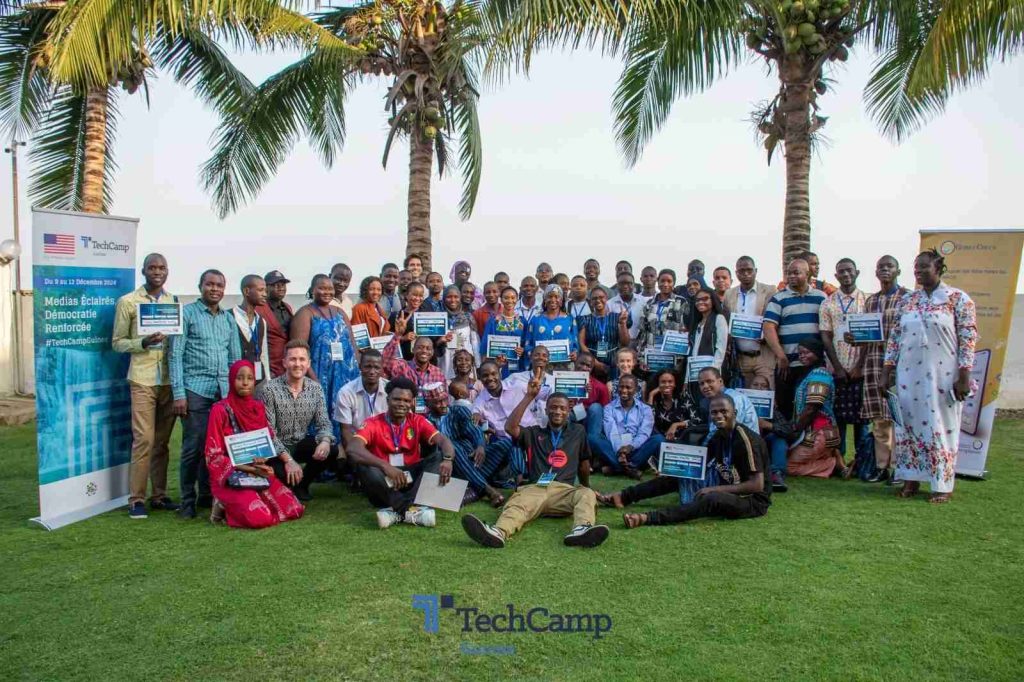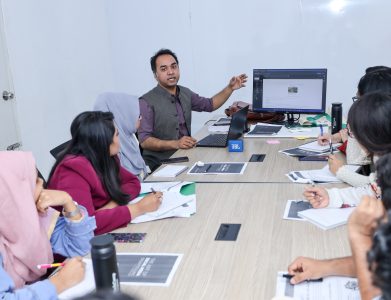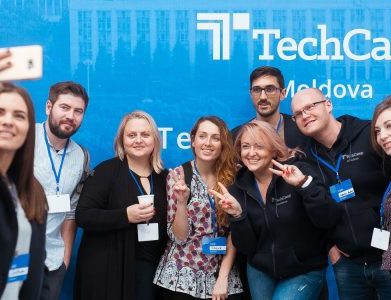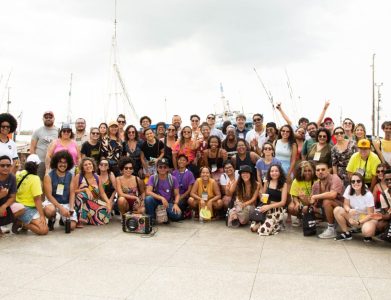2024 was another year of growth and innovation for the TechCamp Program! We hosted 12 dynamic TechCamp workshops, including two “NextGen” TechCamps for TechWomen and TechGirls alumni in the Middle East and Central Asia. Our programs brought together more than 600 participants and trainers from around the globe. These workshops provided an opportunity for individuals to connect, explore new technologies, and collaborate on projects aimed at addressing real-world challenges. As always, our participant-driven approach fostered an environment of learning, sharing, and impact, with participants walking away inspired and equipped to create positive change in their local and global communities. We are proud to highlight some of the outcomes of our programs this year. 2024’s TechCamp programs in chronological order: TechCamp Bangladesh: Empowering Journalists, Ensuring Truth (February 5-8, 2024) hosted by the U.S. Embassy in Dhaka and our implementing partner, Global Youth Leadership Center, aimed to support the country’s efforts in strengthening civil society and promoting free, fair, and inclusive elections. The initiative focused on protecting vulnerable populations and safeguarding civil liberties. Through the program, journalism students gained practical skills in combating disinformation, deepened their understanding of media ethics, and received training in advanced media technologies. Outcomes: We funded five projects from TC Bangladesh:
- Media Literacy Beyond the Screen: Bridging Gaps, Building Minds- The project idea aims to create a media literate generation slowly through a Top-Down Approach. The training workshop aims to close the gap between the media and the general public by connecting the journalist’s point of view with the readers’ point of view.
- Coastal Voices– The vulnerability of Bangladesh to climate change highlights the importance of understanding the situation of those impacted. Yet the representation of climate victims in mainstream media is hampered by the insufficient environmental knowledge and reporting skills of community journalists in coastal areas. Our initiative focuses on developing a group of skilled coastal community journalists through hands-on training led by experienced professionals and environmental journalism experts. Furthermore, we aim to create a networking platform (website and social media channels) to highlight their stories, thus elevating the voices of climate victims and incorporating local environmental issues into broader conversations.
- Mind the Media Gap: Decoding the Truth- To combat misinformation, disinformation, malinformation, and fake news and develop media literacy, the project targets 200 first-year Department of Mass Communication and Journalism students at Jahangirnagar University and Barisal University. The title of our project is ‘Mind the Media Gap: Decoding the Fact’. Leveraging insights from TechCamp, it focuses on media ethics and technology through online and physical activities. The initiative aims to enhance media literacy through digital content creation, online quizzes, and physical training sessions. We chose university students because they are the country’s future change-makers.
- Voice for Voiceless– We are defining “minorities” in a different aspect. When a group of general people cannot raise their voices or share their problems, they themselves become a minority group such as when a common man is being dominated and can not demand his rights from the government, he is a part of the minority group. We are aiming not only to publish their problems but also will publish different positive sides of different events. We will promote citizen journalism and train people. Then we will make them dig into that certain community’s people’s stories to make the people of Bangladesh know about that community and the problems they are going through.
- Empowering media students to identify news sources and eliminating misinformation and disinformation- This project aims to make a web platform where a video content library will be built and teach media students and enthusiastic individuals elaborately how to fact-check by analyzing the legitimate sources. It’s a platform where fact-checkers can create an account and will work as a volunteer. We aim to make certified fact-checkers by giving them offline and online training.
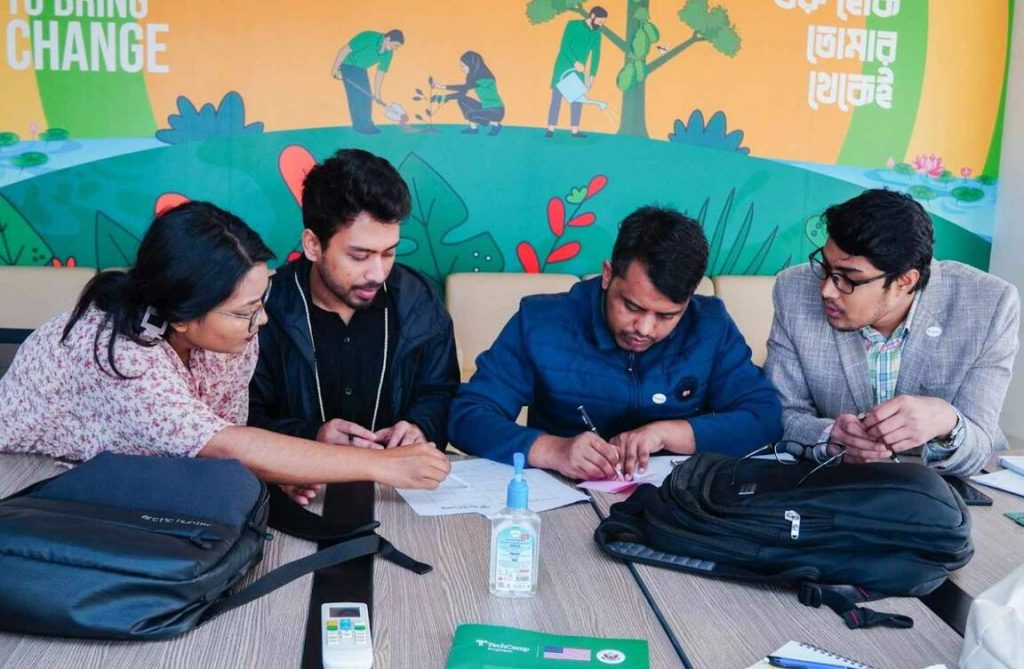
- The Grace Hopper Conference, the world’s largest conference for women and nonbinary people in Tech, in Philadelphia, PA.
- The Kellogg Global Women’s Summit 2024, in Chicago, IL
- The Future Food Systems: Innovation through Progress at Scientific Interfaces, one of the most prestigious Food technology, engineering and sustainability conferences.
We also funded two team projects inspired at the TechCamp workshop:
- Empower HER VR- EmpowerHer VR is an innovative project that leverages virtual reality (VR) to revolutionize education by promoting women’s entrepreneurship and enhancing digital skills. By developing interactive VR modules and training programs, the project aims to provide practical entrepreneurial experiences and essential digital literacy training. This initiative, rooted in the cutting-edge technology tools and concepts learned at NextGen TechCamp Amman, seeks to empower women, disseminate digital knowledge, and foster cross-cultural collaboration across different faiths, sectors, and countries in the region.
- Crafted with Conscience– The “Crafted with Conscience” project aims to empower women entrepreneurs with the skills and knowledge to create sustainable products from agricultural waste materials. Through a series of workshops and online platforms, the project will equip women with the tools to turn their creative ideas into viable businesses while promoting environmental awareness and responsible waste management practices. This aligns with NextGen TechCamp Amman’s focus on using technology for social good and empowering women through digital skills.
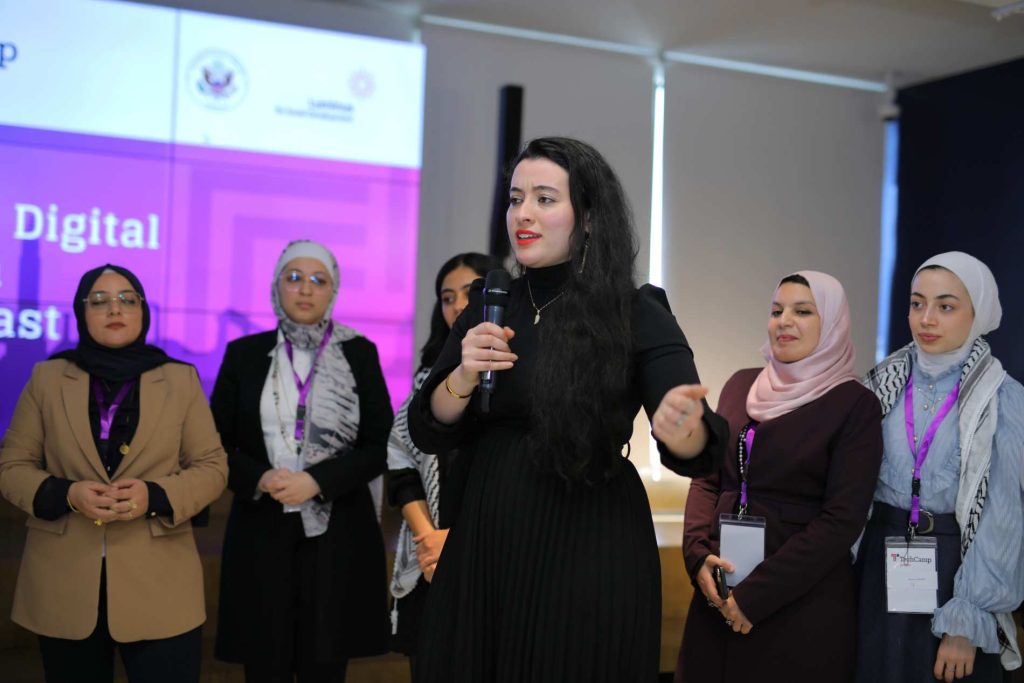
- OIKOGENIUA– The goal of this project is to foster connections and understanding between Greek and Ukrainian youth through cultural exchange and raising awareness of current events in Ukraine using techniques that we have learnt during the TechCamp. Moreover, our team will utilize social media platforms like TikTok and Instagram to share content highlighting cultural similarities between Greece and Ukraine. Our main goal is to increase the empathy towards the Ukrainians in Greece and assist them to fit into the Greek community. In addition to online engagement, we will organize offline community events bringing Greeks and Ukrainians together.
- Echoes of Resilience– Amplifying Success Stories of Ukrainian Refugees: This project, inspired by insights gained at TechCamp, aims to transform the narrative surrounding Ukrainian refugees by highlighting their positive contributions to host communities through a digital database/platform containing individual stories which will act as “seeds” for media professionals to develop into full-scale stories and promote media literacy.
- Disinformation challenges and countering them in hybrid warfare: The case of Ukraine- This is a workshop that aims to bring together leading journalists and experts working in the field of combating disinformation in Ukraine with young journalists and candidate journalists. Against the backdrop of the ongoing conflict in Ukraine, the workshop will delve into the primary narratives of Ukrainian and broader anti-Western propaganda, particularly as encountered in Turkey. Attendees will have the opportunity to explore the sources of these narratives and engage in discussions to glean insights.
- United Αδελφοί (siblings)– Because of the lack of visibility of the Ukrainian Greek refugees, there is a lack of support for them in Ukraine and Greece as well. To raise awareness of their problems and struggle to unite Greeks first in Greece and Ukraine and then worldwide the project will produce a documentary short film and feature article.
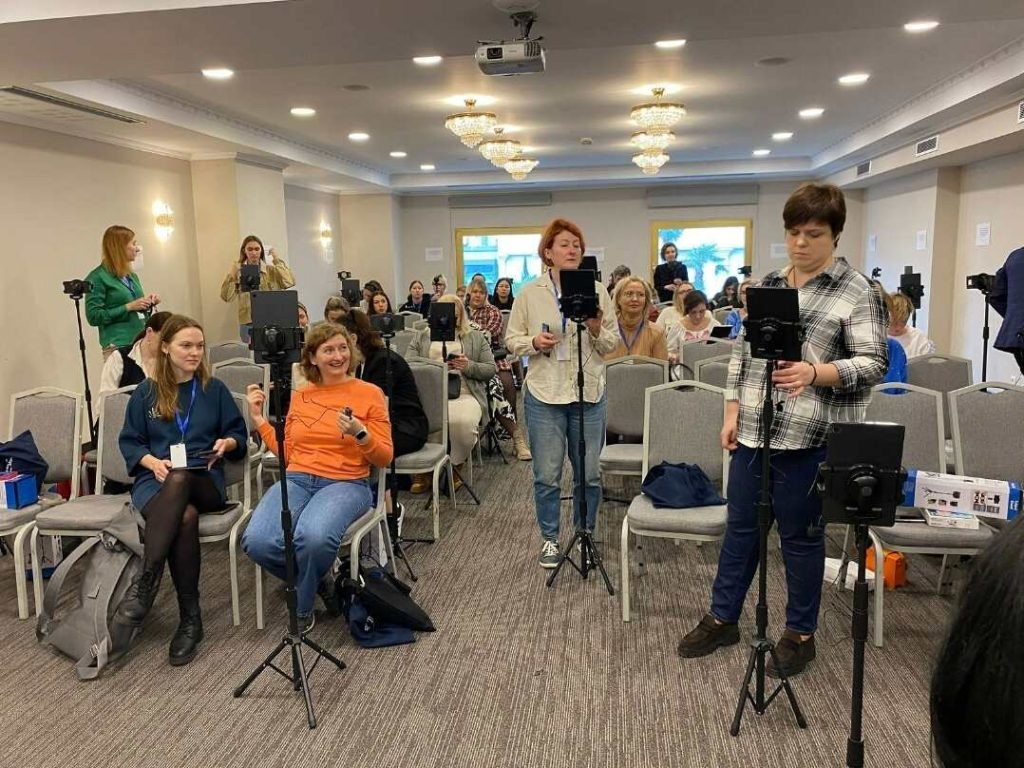
- Science Fair– This project was a two-day Science Fair aimed at increasing high school students’ interest in scientific and technological fields. Through the Science Fair, we can provide them with an opportunity to delve deeper into their chosen niche, test their skills in practical sessions, and keep their enthusiasm alive while further fueling it. We believe that giving students access to the experience and knowledge of experts from various scientific fields, as well as encouraging them to engage in scientific creativity, will broaden their horizons and positively impact their future endeavors.
- Alayaq.ket (protecting elderly people)- The project aims to decrease the number of voice-phishing victims and increase awareness of this problem by creating a reporting mechanism and centralized database of phishing cases targeting elderly people in Atyrau, Kazakhstan.
- Waste Campus– The project aims to increase the number of qualified and skilled workers contributing to the circular economy in Uzbekistan. There will be 12 training sessions in an online marathon format via Telegram for workers in unskilled jobs in the waste management sector, for example, waste sorters, cleaners, cashiers, loaders, etc. Additionally, five women from unskilled jobs from the waste sector in Nukus city in Karakalpakstan will be subsidized to obtain drivers’ license category B and C (trucks exceeding 3500 kg), which allows them to advance their career as waste truck drivers.
- Bai Tomiris- A mobile app that will help women who are financially dependent on their husbands build savings that will secure them in case of divorce. It will do so by teaching women professional skills for jobs with flexible hours, part-time employment, and remote jobs. After the women acquire those skills, Bai Tomiris will help them find a job by using AI to suggest a list of vacancies for their specialty. Next, when women receive their first salary, Financial Buddy (AI chatbot for educating on financial literacy) will help them to distribute their money efficiently to save enough money for a backup.
- Teen Summer Camp “Explore and Decide”-This project is aimed at organizing a three-week Summer Camp project for professional and career development for teenagers aged 14-17 years old. To help prepare them for careers in the future because there is no formal career counseling in Turkmenistan. It will also provide exposure to STEM and STREAM (Science, Technology, Robotics, Engineering, the Arts and Mathematics) careers through educational modules.
- Earthlaq (food waste project)– This project aims to efficiently utilize food waste by connecting food services like cafes with farms. The idea is to transport food waste from cafes to farms, creating a mutually beneficial partnership. The cafes will provide food waste like bread to livestock, while vegetable peels can serve as fertilizer for agriculture, especially pig farms. The entire process will be facilitated through a mobile application.
- My Murajai museum project- A mobile application that will provide audio information about the exhibits and the history of the museum in Kazakh, Russian and English, and will also provide the possibility of automatic translation into other popular languages for the convenience of tourists. During the TechCamp, the project creator realized how important it is to give people the right emotions, and learned tools for integrating AI and the possibility of automatic translation into different languages at one of the training sessions.
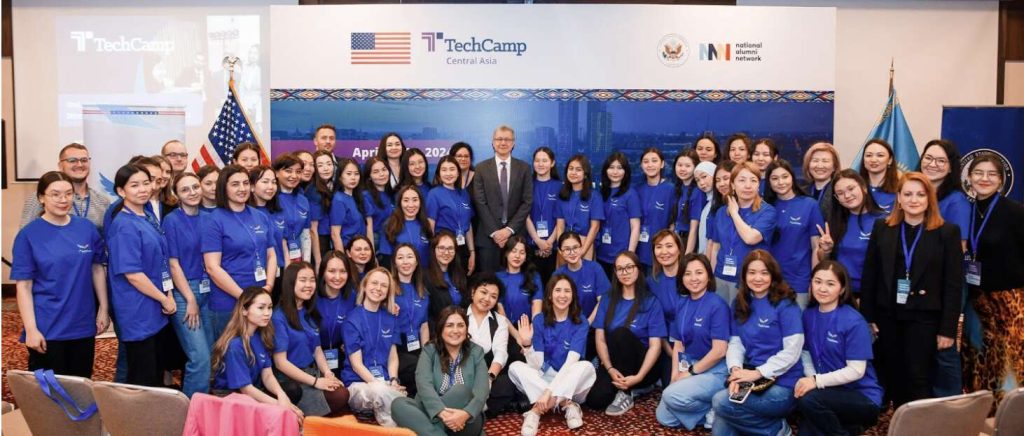
- Women Game Jam Uruguay 2024: First Edition- The Women Game Jam aims to address the gender gap in the video game industry by providing a safe and supportive environment for women and dissidents to create their own games. Through mentorship and collaboration, participants will gain valuable experience, create awesome games, and join a growing community committed to diversity and inclusion.
- Bandido Rush– An action-packed platformer game that aims to successfully launch worldwide on the web-based platform Poki. According to the project team, the TechCamp provided them with a unique framework to identify the gaps in their idea and offered clarity in solving the problems they were facing.
- Dashin Time- A mobile game where players control a fire spirit jumping between platforms. It aims to take the simple mechanic of jumping between platforms and elevate it into an engaging experience through exploration, upgrades, and rogue-like elements. Started in 2022, the project is expected to be completed, released, and marketed within the next 9 months. The insights gained from TechCamp significantly refined the approach to development, publishing, and marketing strategies for the game.
- Jake’s Paralysis– An idea to revamp a game to better resonate with the target audience, using the insights and skills gained at TechCamp. To achieve this, the team plans to apply the production, positioning, and visibility skills learned at TechCamp to elevate their game into the top ranks of upcoming indie visual novels.
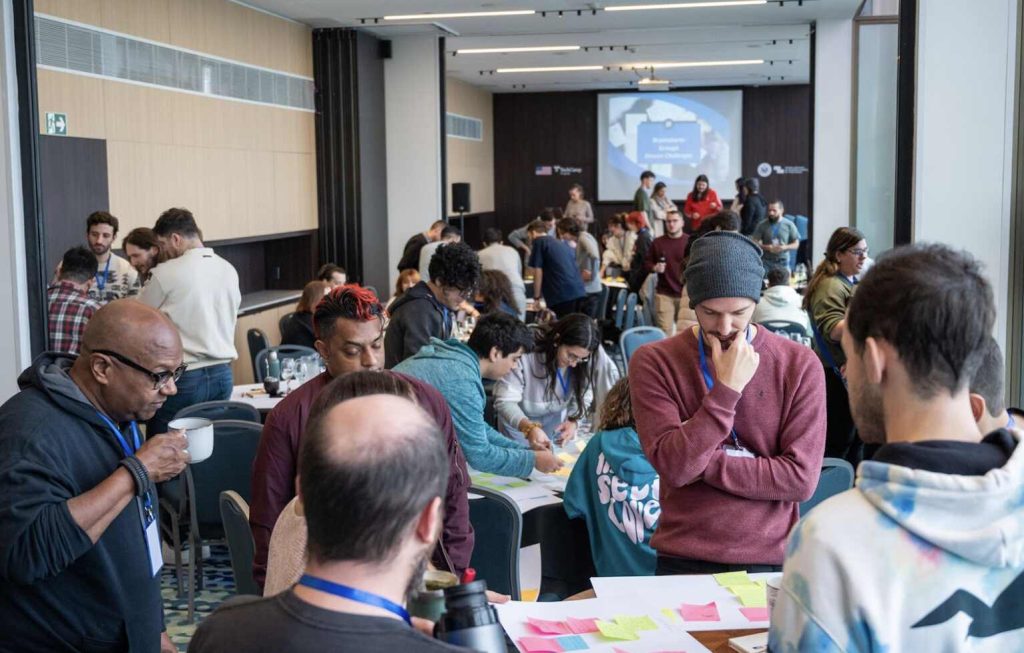
TechCamp Bavaria in Tutzing: Building Resilience in an Era of Disinformation (June 10-12, 2024) focused on equipping participants with tools and strategies to combat disinformation, recognizing that this effort was crucial for maintaining German public support and fostering ongoing U.S.-Germany cooperation. Participants included both German journalists and Ukrainians who are working in media and living in Germany. Outcomes: We funded six project ideas from TC Bavaria in Tutzing:
- Countering Disinformation in History Education in Central and Eastern Europe: An Expert Exchange with Ukrainian Teachers- This short-term initiative aims to address disinformation in history education in Central and Eastern Europe, focusing specifically on Ukrainian history textbooks. It will position the issue of disinformation in history education as an integral part of the conversation about reforming history textbooks in Central and Eastern Europe, and eventually throughout Europe, and will create new networks of history teaching researchers and reformers.
- Dr. Medienkompetenz– An Instagram and TikTok page dedicated to media literacy. Three times a week, these channels will feature reels that will teach media literacy to residents of Germany (in German) and neighboring European countries(in English). The latest cases of disinformation, how to deal with anonymous telegram channels, how to understand what psychological misinformation operations are will be addressed in an easy-to-understand manner.
- Tchuss, Empire– A podcast series that aims to deconstruct imperial methods implemented still in Germany, reveal manipulations, truth-power imbalance, and stereotypes.
- AI/Reality check– This project aims to enhance AI literacy among non-experts through social media engagement and informative TikTok videos, making complex AI concepts accessible and understandable. This initiative builds on techniques learned at TechCamp, leveraging social media to foster a more informed and critical public understanding of AI technologies.
- Disinformation-Dictionary– An online dictionary that debunks the most chronic Russian narratives (in Germany). While there are many NGOs doing fact-checking and maintaining records of single disinformation pieces or campaigns, there isn’t a common, overarching platform where those disinfo-fighters can link, study key Russian narratives, and get the key arguments and facts to spread awareness in their communities.
- Ukraine in Germany – Politics and Media – Will train local Ukrainian groups to produce more Ukrainian language narratives in the media to counter Russian disinformation in Germany. The lack of information in German society about the history of Russian dominance over Ukraine is caused by the dominance of Russian narratives. In order to strengthen the Ukrainian narrative, pro-Ukrainian groups in Germany must unite and systematically expand their lobbying work.
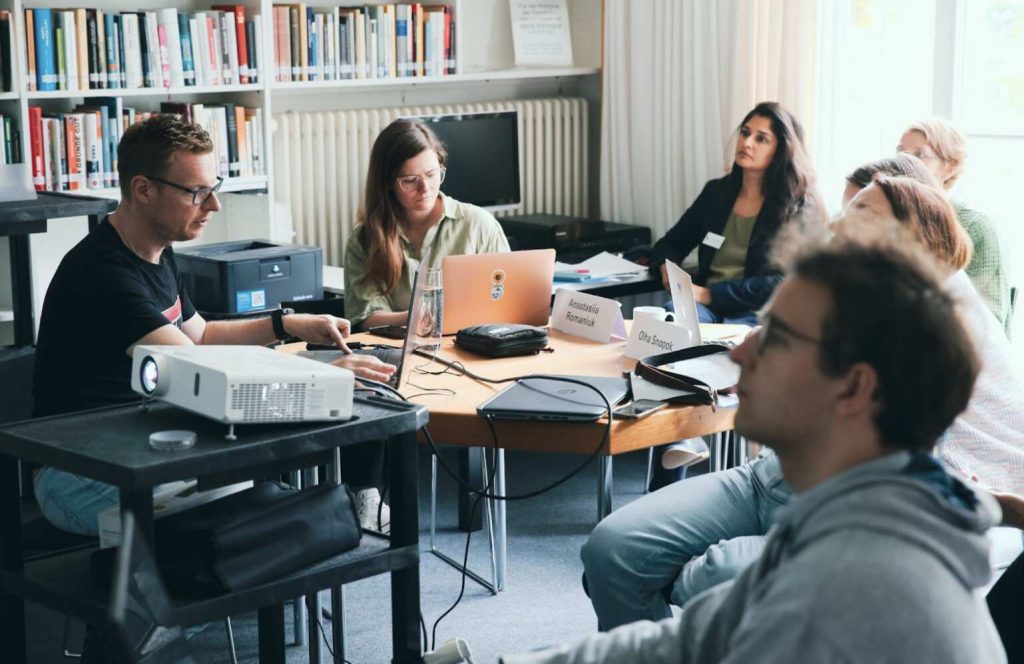
- EcoNet- The project aims to bring all the financial, business and technical data to one place which would help companies to consider strategies and monetize solutions that they haven’t thought about or even didn’t know of their existence. Our audience will be mainly the companies and eventually the regulations parties. The project will provide them with valuable insights on the current available solutions and the financial gains they can acquire when implementing each solution and much more detailed inputs. By offering these insights, we enable businesses to make informed, cost-effective decisions that contribute to both their bottom line and global environmental goals, ensuring long-term success and sustainability. The goal is to empower industrial companies to shift to a more sustainable production process while improving their net profits.
- Renewable Energy Training Internship– At the TechCamp, participants explored the critical importance of implementing renewable energy solutions. The Renewable Energy Training Program aims to equip engineering students from across Israel with essential knowledge on the implementation of renewable energy technologies and their strategic, long-term importance. This project plans to equip them to play a pivotal role in advancing the future of renewable energy in Israel.
- LCA & Beyond- Life Cycle Assessment (LCA) is an analytical tool for evaluating the environmental performance of processes, products, or services. This project aims to integrate LCA with advanced Artificial Intelligence tools to improve the accuracy and efficiency of sustainability evaluations across various industries.
- Summer Street TLV– The Summer Streets Tel Aviv project aims to create a car-free, community-driven event focused on promoting environmental sustainability and climate action through engaging activities.
- Videos on Climate Challenges– The idea of the project is to create a series of 10 – 12 short videos about the biggest (technological, scientific) challenges in the climate field. It will not only highlight Israel’s existent technology in climate tech and scientific research, but also share big challenges that, if solved, could contribute widely in the fight to stop and reduce climate change.
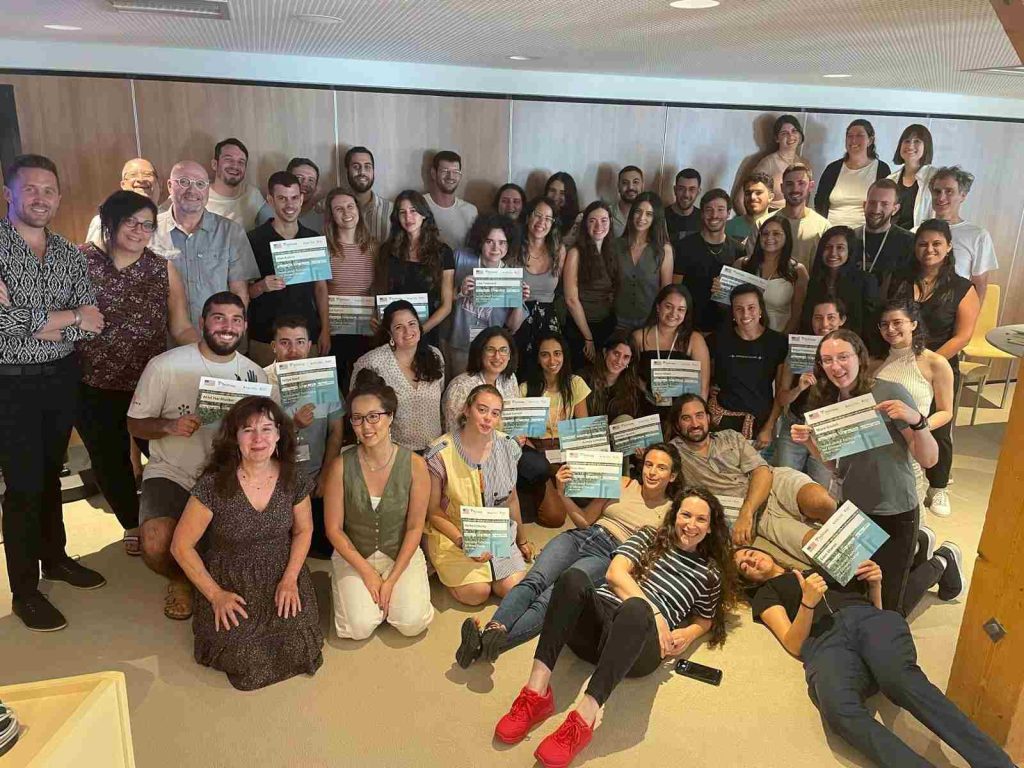
- S@S2030 – Segregation at Source by 2030– This project tackles the challenge of improper waste segregation in educational institutions, leading to excessive waste in landfills, while also addressing the need for behavioral change among younger generations regarding waste management. The Project will educate 1,200 students, staff, and parents at the Dr. Erin N. Nagarwala School in Pune on the importance of waste segregation, personal responsibility for waste generated, and the 3Rs (Reduce, Reuse, Recycle) and aims to equip students with the skills to handle and treat segregated waste responsibly. Ultimately, the project seeks to foster a culture of environmental consciousness beginning at school and institutionalizing waste management as a standard operating procedure.
- Enabling circular waste management system in the peri-urban villages of Chhatrapati Sambhajinagar (Aurangabad) through data-driven decision making- The project aims to collect and analyze the data and insights about the existing waste management system in the peri-urban villages of Chhatrapati Sambhajinagar and drive the policy actions for improved waste management in these areas. The project idea has stemmed during TechCamp and builds on the inputs from trainers about the importance of data in sustainable waste management.
- Upcycled Fabric solutions- This project will create mainstream upcycled solutions from fabric waste. The project will enable immediate employment to rural women who will collect the scraps and sew them into ‘upcycled’ fashion designs. Team leads will connect with various fashion houses/ boutiques/ tailors in India and create awareness of using scraps for upcycled products in the supply chain.
- Saaf PanniCycle – Creating Circular Economy for Source Segregated, Clean, Low Value Plastics (MLP*) from Residential Communities in Pune in an inclusive and collaborative way, considering logistic efficiency and end to end material traceability- The project seeks to channel clean, source segregated low value multi layer plastics (“Panni” as it known by waste pickers) to recycler and upcyclers and create a circular economy. This will also address the critical topic of source segregation behavior change, take into consideration primary collection efficiency through manual baling, support EPR initiatives through end to end digital tech platform for traceability and prevent littering, burning and pollution of our waterbodies through a richly collaborative & inclusive model that engages multiple stakeholders in the waste system.
- Waste-Free Periods- Embrace Reusables to Reduce Sanitary Waste aims to reduce the use of single-use sanitary pads that contain harmful chemicals, which take centuries to decompose and pollute air and groundwater through incineration. By introducing and promoting reusable menstrual cups, we can decrease the number of pads ending up in landfills, offering a more economical and eco-friendly alternative.
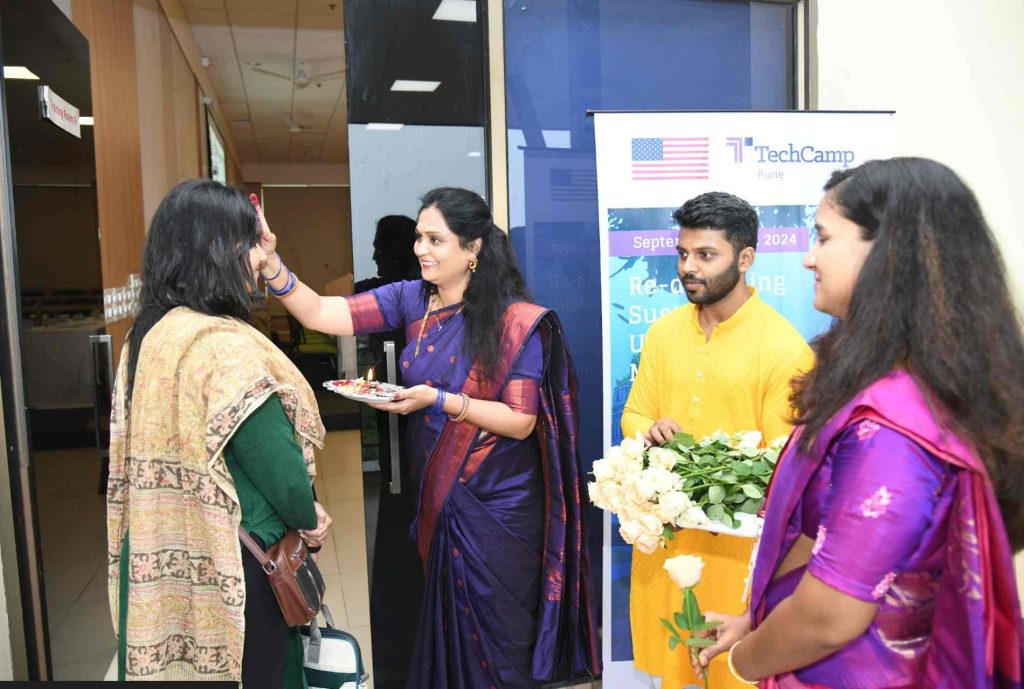
TechCamp Pune Participants being welcomed and blessed before Day 1 commencement.
- WikiRAI– This project empowers young students in Seoul to use AI responsibly by fostering a collaborative community of teachers and experts who access and contribute to peer-reviewed Responsible AI training materials. Users join a diverse, supportive network to share educational resources and exchange feedback, creating an open-source repository dedicated to Responsible AI education. Through this decentralized platform, students gain access to high-quality and peer-reviewed educational programs.
- Chill Out, AI!- Live Carbon Impact Indicator for AI: This project seeks to enhance awareness of AI-related carbon emissions by providing real-time visual indicators, empowering users and companies to make eco-conscious choices and promoting responsible technology use for a sustainable digital future.
- “My Algorithm, My Choice” Campaign– This project addresses the negative impacts of social media exposure on self-esteem and consumption habits, driven by biased recommendation algorithms. These algorithms narrow users’ worldviews and promote excessive, often harmful, content consumption. To counter this, the project offers a 3-month digital detox challenge. Participants begin with a self-assessment and deposit, then work to reduce social media usage, log screen time, and engage in reflective activities. Weekly check-ins and curated newsletters provide support and balanced information. As participants meet goals, they earn back portions of their deposit as rewards. The challenge concludes with a reassessment, AI-generated progress report, and the option to donate unclaimed rewards. This approach raises awareness of algorithmic bias to foster healthier digital habits and improved self-esteem.
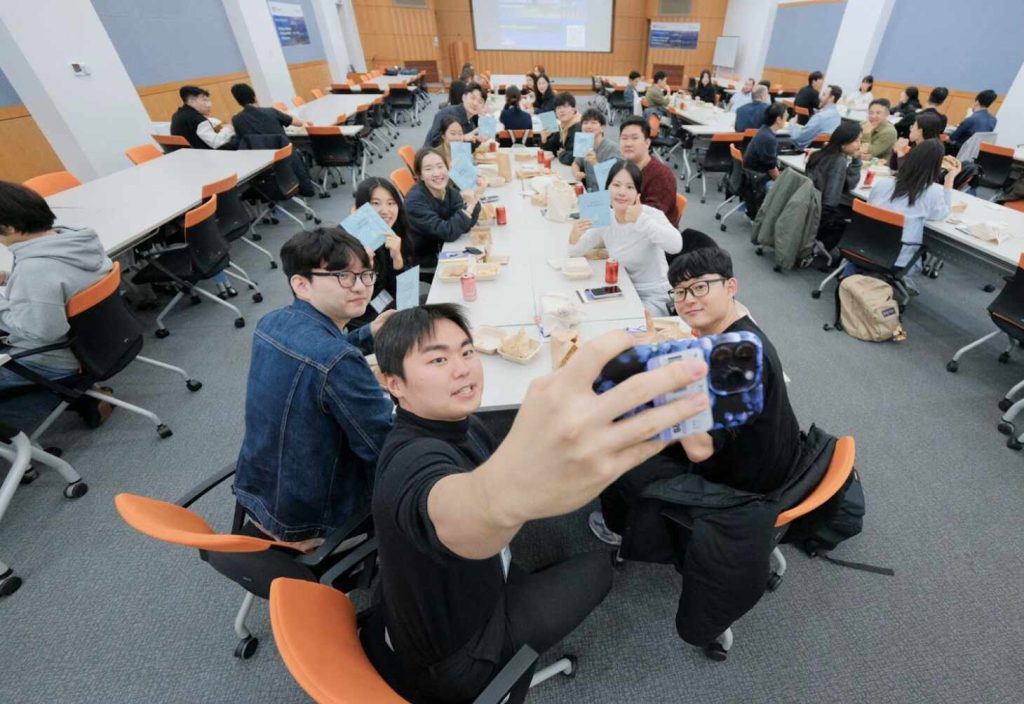
- CrowdPonic– a crowdfunding model for hydroponic farming. The company owns and operates farms; and small farmers, restaurants, or hotels invest collectively. Profits are shared proportionally at the end of each cycle, making hydroponics more accessible without high upfront costs.
- TadwirChain– A platform that connects waste collectors and recyclers and uses AI for quality control as well as blockchain for transparent transactions while fostering sustainable waste management and empowering local communities to participate in the circular economy.
- StepGlow– This project transforms industrial and plastic waste into durable, fluorescent, eco-friendly tiles for pavement, reducing pollution and promoting sustainability through scalable production and local partnerships.
- Ecophyte- transforming heavy metal contamination into industrial opportunities by using an enhanced GABS6F plant extract that has a natural ability to absorb heavy metals from soil and water.
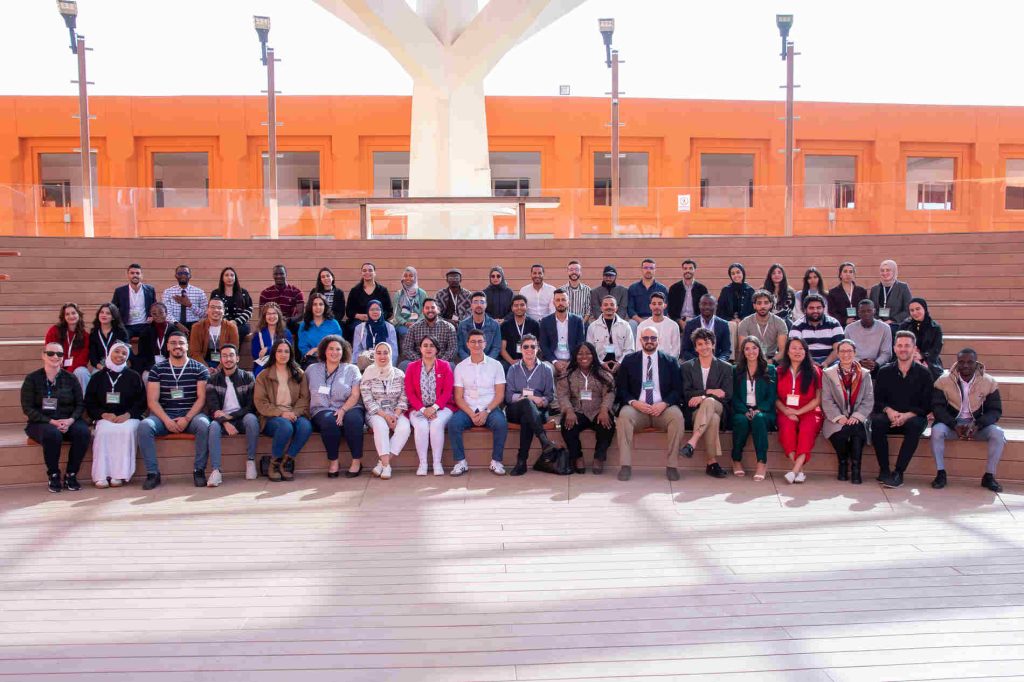
- The Temple of Local Languages: A Media Platform to Revive Local Languages, Affected by the Closure of Media Outlets in Guinea- We are setting up a newsroom in ten languages to reach as many citizens as possible. According to the 2014 General Population and Housing Census, 77.1% of women are illiterate compared to 59.5% of men. This highlights a real need to deliver information in local languages to combat the misinterpretation of topics. It should be noted that the Republic of Guinea is rich in linguistic diversity, but some languages are threatened with extinction. Our proposed solution is to inspire the younger generation to value this cultural heritage.
- Tech 4 Youth Girls Labé– This is a project aimed at combating cyberbullying of young girls and women through the establishment of digital clubs in four schools (one high school, one public middle school, one vocational school, and one private school) in the Labé region. The project will encourage responsible use of digital tools through awareness sessions and training, with the goal of increasing their digital resilience (digital hygiene) to enhance their online security. It will contribute to the creation of a safe and inclusive environment for them by promoting responsible use of digital tools.
- ACTIONS COMMUNES– This project aims to strengthen the capacities of rural women in media education. The Nzérékoré region has experienced multiple conflicts between 1990 and 2024, largely driven by false rumors. These recurring conflicts have resulted in significant loss of life and substantial material damage. Women, who are often at the heart of these concerns and victims through their children, are not always involved in conflict resolution due to their gender. That is why the ACTIONS COMMUNES project will focus on strengthening capacities in combating disinformation through awareness campaigns using visual tools (image boxes) and media campaigns in various local languages of the targeted area. This project will empower women, including those who have not had the opportunity to attend school, to actively participate in the fight against disinformation.
